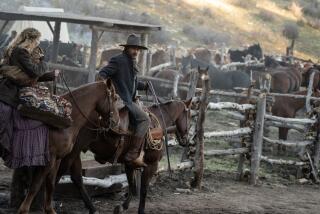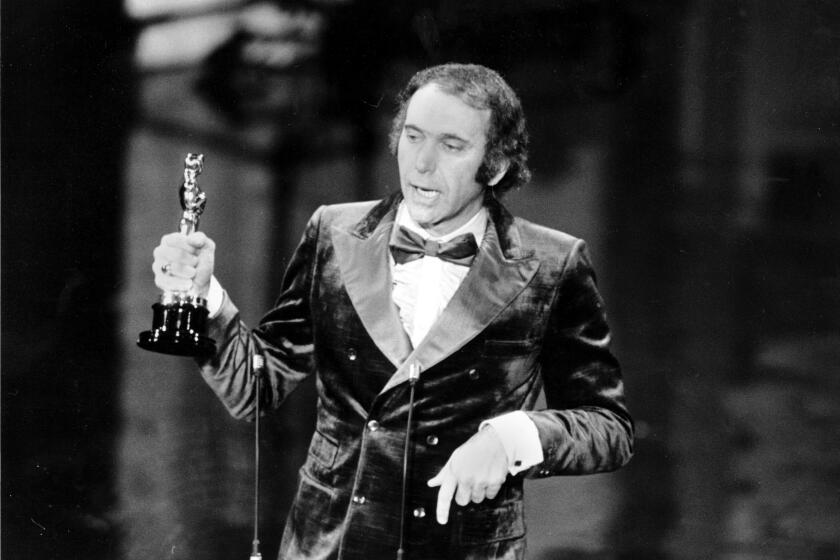Perfect Casting
So far, the columnist has written only two words on his computer screen. They are the same words he always begins with: “Good Morning.” He is not visibly nervous, but he is not relaxed. Despite his gracious welcome and genteel air, a visitor feels like an intruder. Deadline is a mere six hours away.
From his mid-Wilshire corner office, the clarity of winter has produced a postcard view of palm trees, mountains and sky: what people in Peoria might imagine when they dream of Hollywood. The columnist hasn’t noticed. His back is to the window. “Mind if I roll up my sleeves?” he asks. The phone rings. He picks it up, takes a sheet from a tall stack of yellow paper at his right elbow and positions it just so. He grabs his pen. His tone is convivial and clipped. In an industry that invented the dilatory art of schmooze, Daily Variety’s Army Archerd is a model of verbal economy.
Hello? Hi, Paul, how are you? OK, thanks. Not too shabby! Whose company is it? Uh-huh. So it’s to be released as a feature, or on tape? I see. This is directly from the play? Who did the script? Oh, that’s great! So he doesn’t have to complain about the changeover from the play to the movie. Is he on the set or anything? I see. Sorry you didn’t get to put Mira in the picture, though. She’s terrific.
A second line rings. Hold on a sec, please. Hello? Yeah, are you still with the actor Benigni? I have a terrific story on him that I just found out early this morning and I HAVE to talk to him, so could you reach him for me? You know, of course, he knows me from Europe and so on. So could you please have him call me? It’s about the lady whom he and his wife had dinner with last night, and I was wondering how that all came about. Thanks. Goodbye.
Sorry, Paul. So, where are you shooting?
If you’re a civilian, as those in The Industry call those who are not, you may know Army Archerd as the dapper gentleman who interviews the stars as they arrive at the Academy Awards, a task he has performed each year since 1958, or perhaps as a co-host and associate producer of the annual People’s Choice Awards since its inception in 1974, or, more recently, as a contributor to the E! channel’s “Gossip Show.”
If you’re an insider, the 77-year-old Archerd is a household name, maybe a daily presence. Since 1953, he has churned out his “Just for Variety” columns at the rate of five a week, cutting back to four a week only in the last year. With a circulation of 35,500, Daily Variety, which chronicles the wheelings and dealings of Hollywood, is a minnow in a media ocean. But look who’s reading: According to a survey commissioned by Variety last year, the average reader has a household income of $404,000.
Archerd’s readers don’t look to his Page 2 column for attitude or poetry. They want information, and his “just the facts, ma’am” tone fits the bill. The column--replete with the slangy jargon peculiar to Variety (where films are lensed, not shot, and helmed, not directed) and a soupon of French--is a three-dot stew of celebrity items (restaurant sightings, couplings and uncouplings, births, deaths and illness) and industry information (deals, shoots, fund-raisers, lawsuits, parties). Archerd says his only criterion is newsworthiness. And, preferably, exclusivity. Some of his items may read like press releases, but you can be sure he had them first. And, perhaps understandably, given his age and experience, the folks who populate his column are more Chasen’s than Sky Bar. “He’s not writing a lot about Cameron Diaz,” says one industry observer.
Daily Variety editor in chief Peter Bart calls him “one part community bulletin board, one part community conscience, one part cheering section.” Archerd’s energy and dedication amaze (and gratify) his boss: “He never comes close to burnout,” says Bart. “I wish some of our younger reporters got as excited as he does when he lands a big story. He is genuinely an example of someone who loves what he does. It is perfect casting.”
“He clearly likes most of the people he writes about, but he doesn’t fawn over them,” says Damien Bona, co-author of “Inside Oscar: The Unofficial History of the Academy Awards.” “For anyone interested in the film industry, he’s invaluable.”
Archerd is so reliable that when a severe bout of flu in 1983 forced him to miss work for the first time in 30 years, the Associated Press reported that “confusion and consternation reigned [in Hollywood] when the column failed to appear for three days.”
“What shakes me up about his columns is that in most of them he must have 18 different things,” says producer Aaron Spelling, a longtime friend who briefly shared his house with Archerd in the late ‘60s after Archerd’s first marriage broke up. “How in the hell does he find out all these things?”
Don’t forget, says Archerd, “I’ve been doing this for a while. So I have a lot of friends and people I know in the business. And publicists, of course, always want to see their clients in the column.”
Although Archerd receives tips in a constant stream of phone calls and faxes, he says he always tries to speak directly to the players. His friendships lead to items as well. (So, for instance, in August 1989, amid a swirl of rumors that their marriage was on the rocks because of wifely wandering, he sat down with the Spellings. “These stories make me out to be a slut,” a tearful Candy Spelling told Archerd. The wire services loved it.)
Should you catch him on television this evening, it is unlikely you will notice that Archerd had trouble sleeping last night. And though it is possible that he passed the night in blissful slumber, it is also extremely unlikely. For just as it is an annual tradition that Archerd greets and interviews Hollywood’s bejeweled and bespoke as they arrive at the Oscars “kudocast,” so it is a tradition that Archerd is too nervous to sleep well the night before.
At least that is what he would have you believe.
And there is no reason to doubt him. A hallmark of Archerd’s longevity is his reputation for keeping his word. It is a quality rivaled only by that extraordinary work ethic, a thing so ferocious one suspects it is partly fueled by fear: Fear of getting scooped. Fear of missing a deadline. Fear of blundering in front of an audience, or, worse, in print.
Bart says it took a long time to get Archerd to agree to drop one column a week. “The first thing he said was, ‘But someone may scoop me!’ ”
*
Archerd was given his first break by Bob Thomas of Associated Press, the only reporter Archerd can think of whose Oscar attendance record exceeds his own. (Thomas, 13 days younger than Archerd, will be attending his 55th show tonight.) The pair had attended UCLA together, but did not meet until after Archerd was discharged from the Navy in 1945. Thomas hired him as a “leg man” to help compile Hollywood items for his AP wire column.
“I wouldn’t be here if it wasn’t for Bob,” says Archerd.
In 1947, Archerd left AP and hired on as leg man for another Hollywood columnist, Harrison Carroll of Hearst’s Herald-Express.
Six years later, in 1953, Daily Variety hired him when columnist Sheilah Graham left. His column debuted on April 27: “Good Morning: Here’s the public’s answer to the future of 3-D: nine out of 10 want to see more.” He ended the year on a poignant note: “An over-dressed gal, waiting for a table at a Las Vegas supper club: ‘Isn’t this disgusting, isn’t this awful--waiting.’ A soft voice behind her: ‘I don’t mind--I can remember waiting in line for bread.’ Happy New Year!”
Over time, Archerd has been criticized for accepting fees from studios to emcee premieres and for taking first-class studio-paid junkets to movie sets. A double-standard in the Daily Variety newsroom?
Archerd, says Peter Bart, “has done this work over decades. I think one has to allow for the fact that someone doing something over generations does present a circumstance that is different from someone who’s more recently hired.”
Asked if he accepts gifts, Archerd replies, “I don’t ask for anything, but I don’t insult people.” And though the tone of his column is generally sunny and informational--one mid-level studio publicist says “people use him because he’s kind”--he is capable of stinging criticism.
He’s knocked Jerry Lewis for “mimicking people by being grotesque and making fun of their deficiencies . . . and he’s involved in that charity.”
He has taken on Charlton Heston over gun control. In 1995 and 1996 in at least five columns, Archerd, who is Jewish, slammed Michael Jackson hard for using anti-Semitic slurs in his song “They Don’t Care About Us.”
Jackson called Archerd to apologize and to announce that he would be changing the lyrics.
Recently, Archerd waded into the controversy surrounding the honorary Oscar that is to be presented tonight to Elia Kazan. In one piece, he recounted the professional wreckage that followed the director’s 1952 appearance before the House Un-American Activities Committee and concluded: “I, for one, will not be giving him a standing ovation.”
Writer Larry Gelbart, who has known Archerd for nearly 30 years, says the columnist’s opinions get respect “because most people know that Army does not use his position as a vehicle of revenge or for self-promotion. He knows his place is secure and recognized and he doesn’t have to wear all his medals to impress us.”
Those “medals” include a star in front of Mann’s Chinese Theatre on the Hollywood Walk of Fame (“My mother was very pleased,” says Archerd.) and a special plaque from the Academy of Motion Picture Arts & Sciences for his Oscar arrival emceeing. He has also played himself in countless movies and TV shows.
When asked to name his friends, the short list is composed of names from Hollywood’s old guard: Paul Newman, Gregory Peck, Sidney Poitier, Kirk Douglas.
“He really is the straight arrow by which all other columnists should measure themselves,” says Paul Newman. “He’s painfully honest and he does his homework, and he never publishes anything without getting double verification on it.”
“We all know he is absolutely trustworthy,” says Gregory Peck, who calls his longtime friend Armand. “If you tell him something off the record, he will never betray you. He keeps a confidence, and I think that’s why he has been able to write this column for so long. He doesn’t grind axes.”
“Here is a guy whose word is his bond,” says Sidney Poitier.
Archerd is gracious and courtly with stars and big names, but not every industry insider loves him. Some publicists who refuse to be named say his terse telephone manner is rude and intimidating. “I don’t think anyone looks forward to calling him,” says one.
“He should be respected when he’s been doing something as long as he has,” says a former studio executive with decades of experience. “But he isn’t breaking news the way he used to.” Although Archerd prides himself on never having printed a retraction, some of his industry sources say this is because he refuses to acknowledge his mistakes.
Don’t tell that to Selma Archerd, who fell in love with her husband at 16 (he was 19 and they met at a party) and married him 28 years later after both of their first marriages ended in divorce. Between them, they have four children and five grandchildren--one of whom, to his delight, has nicknamed Archerd “Honey.” Selma is as outspoken about her husband’s career as he is modest.
“I am very proud of him and I am very fierce about protecting the status of what he is,” says Selma, an actress with a recurring role of Nurse Amy on “Melrose Place,” which is produced by Aaron Spelling. “He isn’t the richest man in the world, or the most powerful . . . but what he has, I want respected. And I’ll take the title of pain in the ass so that he will be respected.”
And he does get respect.
Occasionally, Archerd’s juicy celebrity items are worldwide scoops. He was the first to report in 1991 that Julia Roberts had flaked out on Kiefer Sutherland three days before the wedding, first to announce in 1992 that Annette Bening had secretly removed Warren Beatty, the father of her infant daughter, from the active list.
“He was first to report that my salad dressing was outgrossing my movies,” says Paul Newman.
He broke the biggest story of his career on July 23, 1985: “The whispering campaign on Rock Hudson can and should stop. He has flown to Paris for further help. His illness was no secret to close Hollywood friends, but its true nature was divulged to very, very few. Doctors warn that the dread disease is going to reach catastrophic proportions in all communities if a cure is not soon found.”
The story rocked the world.
“It was a thunder strike,” says Bob Thomas.
For two days, Hudson’s spokespeople maintained that the actor had flown to Paris to be treated for liver cancer or unexplainable fatigue.
“Someone had anonymously mailed him a photocopy of the doctor’s records,” says Selma Archerd. “And he’d had them for months, but it was so devastating to print it. It was so shocking--someone that you actually knew! But he waited until Rock was really out of it. The press agents tried to discredit Army. His [previous] editor said he might have to retract it. And Army said, ‘Please don’t do that to me. The story is right.’ And, of course, it proved to be right.”
Archerd is so well-connected that, if a star takes ill, chances are he will reach a family member for a bedside quote. “He knows all the numbers of all the nurses on every floor of every hospital,” says Bart.
Each day at the office, an intern delivers to his desk a stack of gossip and Hollywood columns from New York newspapers, which he reads, he says, “to see what they’ve stolen from me or if someone has double planted an item.”
*
If all goes as planned, Archerd will have spent Saturday observing Oscar rehearsals at the Dorothy Chandler Pavilion. This morning, he will write the bottom half of his Monday column and arrive downtown at about 2 p.m. He’ll chat with the director of the show, check outside to size up the crowd. Around 4 p.m., he’ll mount the platform that puts him close to the star-struck civilians who have camped out in temporary bleachers.
“Good evening, movie fans!” he will say, paraphrasing his famous column opening. And the movie fans, he says, chant his name and “go berserk.” (“It always amazes me that anyone knows who the hell I am,” he says.) For the next 90 minutes, assisted by two Oscar staffers, he will greet and interview the stars. Around him, controlled chaos will reign: paparazzi, mainstream photographers and reporters will jostle for space along the roped-off red carpet as boisterous fans scream the names of arriving stars. As news helicopters hover, the fringes will teem with police officers, security guards, scantily clad has-beens or never-weres vying for attention, anonymous, unglamorous academy members, perhaps a few protesters with placards.
Archerd, his head crammed full of names and facts, will be above the fray. In his Armani tuxedo, silk tie from Harrod’s and black velvet smoking slippers gilded with his initials embroidered on the toes, he will be, promises his wife Selma, “sartorially perfect.”
He will be a picture of cool as he interviews the Gwyneths, the Toms, the Billy Bobs. But he will not be relaxed. Because as he’s asking, say, “Saving Private Ryan’s” Steven Spielberg how he’s feeling tonight compared to how he felt when he was nominated for “Schindler’s List,” he will be keeping an eye on who is arriving and needs to be interviewed and the dwindling time. “That clock,” he says, “waits for no one.”
Moments before the show begins, he will take his seat. Now his job will be to report for his readers what happens in the auditorium, the tidbits they won’t see on TV. As the Best Picture Oscar is being announced, the columnist will slide out of his seat and make his way to the aisle. He’ll wait to see how the audience reacts, then will dash to an elevator and compose a lead on his way up to the pressroom. He’ll file the top of his column by phone, grab a sandwich, then a notebook, and head to the Governors Ball, then into the party-filled night. He is, needless to say, invited to everything.
Monday morning, he’ll be at his desk. He will sit with his back to the window, his yellow paper neatly stacked, his pen at the ready. He will type the words “Good Morning.” The phone lines will ring. And the conversation will go something like this:
Hello? You’re where? Paris? Coming back to L.A. tomorrow? My God. Who? Oh, great. I beg your pardon. Hold on a sec.
Hello? So are you on budget and on schedule? How many days now? Oh, that’s great! Wonderful . . . I gotta put that down exactly. So have you got any other things you’re trying to direct? OK, well, let me know about it when they do happen. Don’t let me read about it, OK?
Hello?
More to Read
Only good movies
Get the Indie Focus newsletter, Mark Olsen's weekly guide to the world of cinema.
You may occasionally receive promotional content from the Los Angeles Times.







